Flowing Towards Flourish: The Unsung Heroes of Municipal Water Management – Pumps
2024.06.14
The Importance of Pumps in Municipal Water Managing
Municipal Water Management - vital for the health, vitality, and sustainability of communities
Municipal water management is like the circulatory system of human body, ensuring that water flows smoothly and efficiently throughout the villages and cities. From sourcing to treatment, distribution to drainage, it safeguards public health, promotes economic activities, and elevates life quality for all residents.
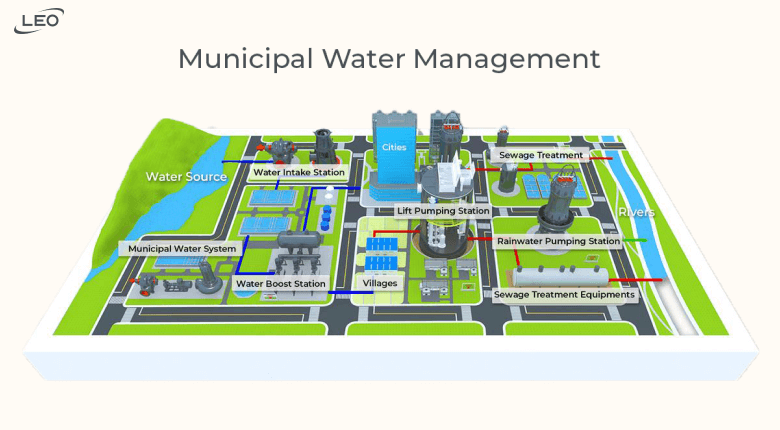
Municipal water management systems are vital for delivering clean water and managing wastewater.
Pumps - The Backbone of Municipal Water Management
Central to municipal water management system are pumps, which facilitate water supply & distribution, sewage treatment, and flood control. Their efficiency and reliability underpin the entire systems, maintaining a sustainable and resilient living environment. Here's a brief overview that how pumps play a vital role:
Ensuring Consistent Water Supply
Pumps are integral to transporting water from sources like rivers, lakes, and reservoirs to treatment plants and then to homes and businesses. They maintain pressure in the distribution system, ensuring consistent water flow.
Elevating Efficient Wastewater Management
In wastewater treatment, pumps move sewage from residential and commercial areas to treatment facilities. They handle various stages of the process, from initial collection to final discharge.
Enhancing Prompt Flood Control
Pumps are crucial during heavy rains and flooding events, removing excess water to prevent damage to infrastructure and property.
Expediting Sustainable Management
Pumps are required to be more and more energy-efficient while optimizing performance, which helps reducing operational costs and environmental impact.
The Water Management Pumping Solutions for Municipalities
In an era where improvement in livelihoods and urbanization is accelerating at an unprecedented pace, managing water resources effectively has become one of the most pressing challenges for cities worldwide. Municipal water management encompasses a wide array of tasks, including water supply, wastewater treatment, stormwater management, and flood control. At the heart of many of these tasks are pumping solutions. Let’s explore those solutions tailored for various municipal applications.
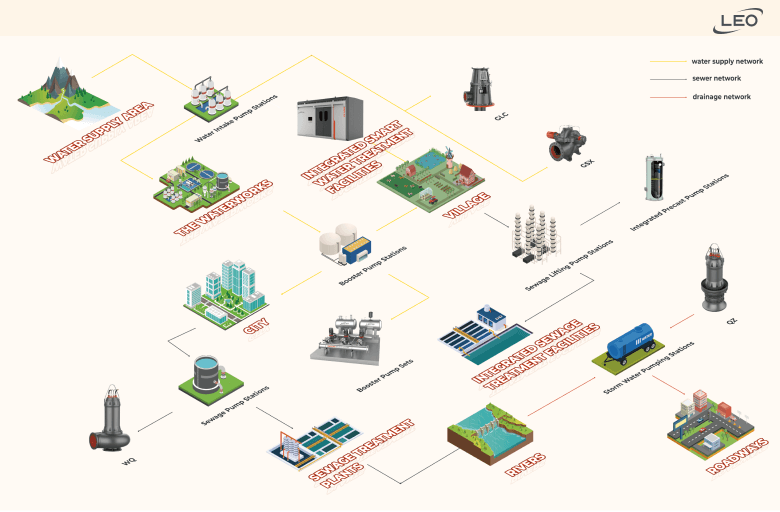
Notes: It is a map to assist you in understanding municipal water applications with LEO pumps.
Water Intake Pump Stations
- Application: Drawing water from sources like rivers and reservoirs.
- Solution: Reliable pump systems transport water to treatment facilities, ensuring steady clean water supply.
Booster Pump Stations
- Application: Enhancing water pressure for urban and rural distribution.
- Solution: High-efficiency pump systems maintain constant pressure, delivering treated water to homes and businesses.
Sewage Pump Stations
- Application: Transporting wastewater from residential and commercial areas.
- Solution: Robust pumps move sewage to treatment plants, facilitating safe and effective wastewater management.
Stormwater Pump Stations
- Application: Managing excess water during heavy rains and floods.
- Solution: Powerful pumps quickly remove water, safeguarding people, infrastructure and properties.
Advanced pumping solutions ensure efficient water management across various municipal applications. From drawing water at the source to ensuring consistent supply and managing wastewater, the pumps shall be designed to meet the unique challenges of urban and rural environments, contributing to sustainable and resilient communities.
Cutting-Edge Pump Technologies Revolutionizing Municipal Water Management
Advancements in pump technology are enhancing municipal water management through pumps with:
- IoT for real-time monitoring
- energy-efficient designs with VFDs
- renewable solar-powered systems
- integrated advanced filtration and UV treatment
These innovations boost efficiency, reliability, and environmental sustainability, transforming how city and countryside manage their water resources.
Case Studies and Impact
Municipal Water Intake Pumping Solutions

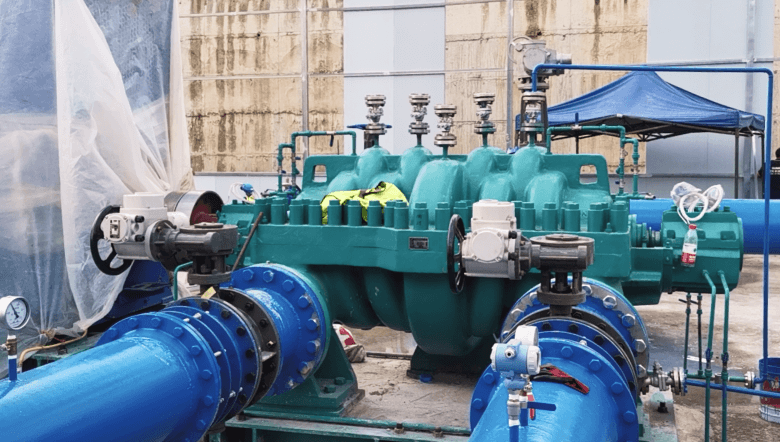
Project: Yangtze River Water Lifting Emergency Project
Product: Four sets of 400DS-85*3 LEO Multistage Centrifugal Pumps
During the summer, China faced extreme high temperatures, with 23 provinces and cities experiencing temperatures above 40°C. Chongqing was particularly affected, with 197 rivers suffering from water shortages, 90 reservoirs dried up, and 235,800 hectares of crops impacted.
2022 summer, in Fengjie County, Chongqing, 33 villages and towns were affected by drought, threatening domestic water supplies for residents. Fengjie County initiated the Yangtze River Water Lifting Emergency Project to secure urban water supply. LEO won the bid to provide Multistage Centrifugal Pumps due to their outstanding performance, quick delivery, and professional service.
Each pump had a large flow and high head, delivering 40,000 cubic meters of water per day to Fengjie County. The Yangtze River Water Lifting Emergency Project was successfully implemented, securing the water supply for residents in Fengjie County.
Municipal Sewage Pumping Solutions
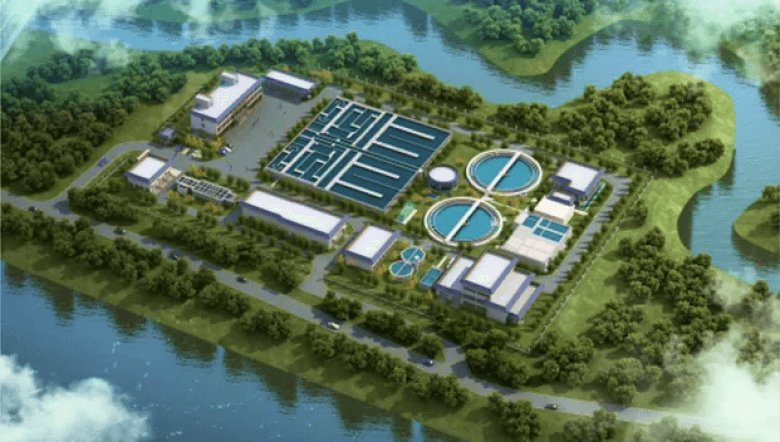
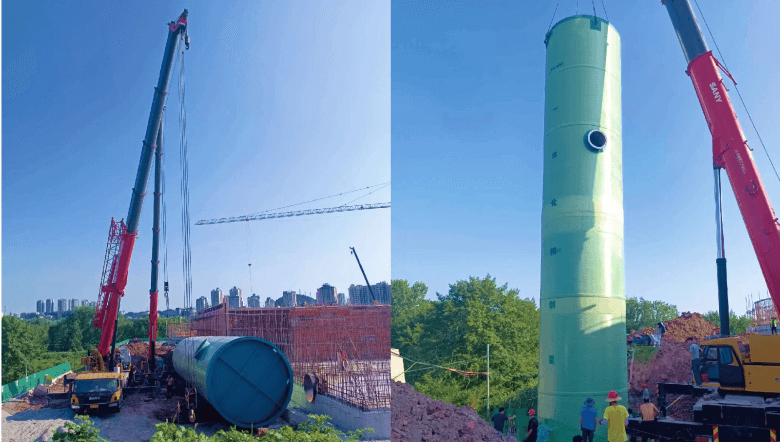
Project: Qu County Sewage Treatment Plant
Product: Smart Integrated Prefabricated Pump Station
LEO has consistently provided municipal sewage solutions for wastewater treatment projects across China, with the Qu County Sewage Treatment Plant in Dazhou, Sichuan Province being a notable example. To protect the Yangtze River's ecosystem and ensure clean water flows into the river, the local government initiated a comprehensive urban sewage treatment campaign. The new plant in Qu County, with a capacity of 30,000 m³/d and effluent quality meeting Class A standards, aims to significantly reduce pollution and enhance the local water environment and ecological balance.
For this project, LEO delivered a customized smart integrated prefabricated pump station, addressing key challenges with the following strategies: rapid production and installation, completing the design-to-delivery process in just over 20 days; specialized transportation and precision installation using a specialized vehicle for nighttime transportation and executing precise installation in restricted space; easy maintenance and durability with reinforced fiberglass (GRP) for a 50-year lifespan and a self-cleaning design; and automated control and smart monitoring with LEO's submersible pumps and intelligent systems for efficient sewage processing and remote management, reducing operational costs by 30%. Successfully installed before the rainy season, this station will treat 30,000 m³/d of sewage for Qu County and surrounding areas, protecting the Yangtze River's water quality and ecological balance, demonstrating LEO’s commitment to ecological conservation and sustainable development.
Challenges and Future Directions
Municipal water management faces significant challenges despite advanced pump solutions. Aging infrastructure, population growth, and climate change stress existing systems. While investing in modern pump technology is crucial, comprehensive planning and integrated strategies are equally important.
Looking ahead, integrating artificial intelligence (AI) and machine learning (ML) in pump systems could revolutionize the water management. AI and ML can offer predictive analytics, optimize maintenance schedules, and enhance decision-making, thereby improving system resilience and efficiency.
Collaboration between government agencies, private companies, and communities will be essential to address these challenges and create sustainable, resilient municipal water systems.
Conclusion
Pump solutions are indispensable in the quest for effective municipal water management. The evolution of pump technology, from basic mechanical devices to sophisticated smart systems, reflects the growing complexity of urban and rural water challenges. By continuing to innovate and integrate advanced technologies, country can achieve sustainable water management, ensuring the well-being of their populations and the health of the environment. The future of municipal water management lies in harnessing these technological advancements to create resilient, efficient, and sustainable water systems for generations to come.
Hot Media

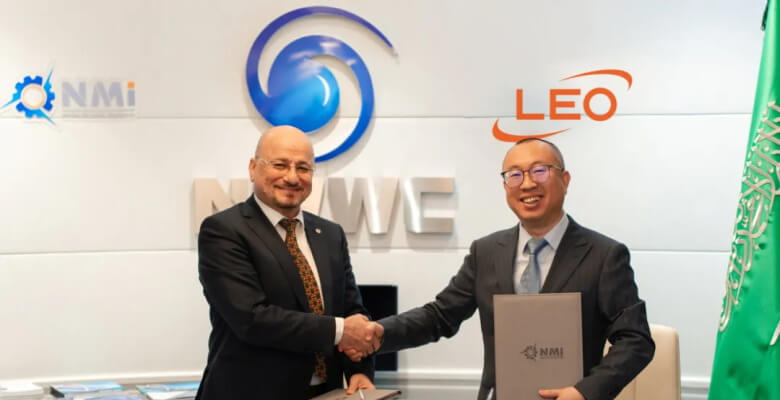
A Landmark LEO–Al Mo...
2025.12.02


LEO at the 138th Can...
2025.10.22


LEO Pro-Bono Water S...
2025.08.15

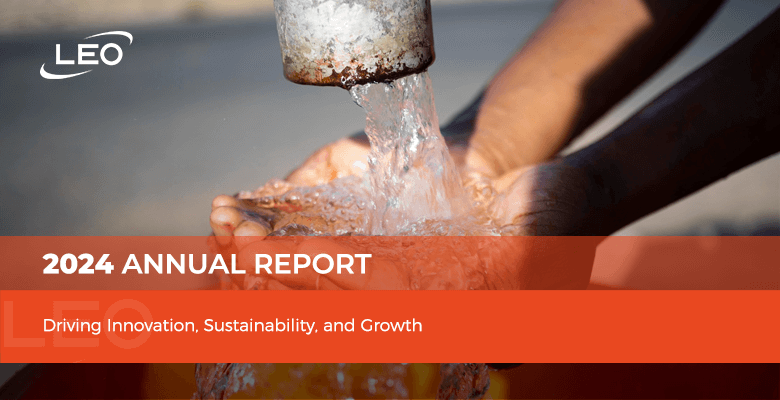
LEO PUMP 2024 Annual...
2025.05.14


A New Journey, A New...
2025.03.18


30 Years of LEO: lea...
2025.01.06


LEO at 30: United Th...
2024.12.16


A New Journey, A New...
2024.11.21


Showcasing Innovatio...
2024.10.25


LEO “Growing Forward...
2024.07.19

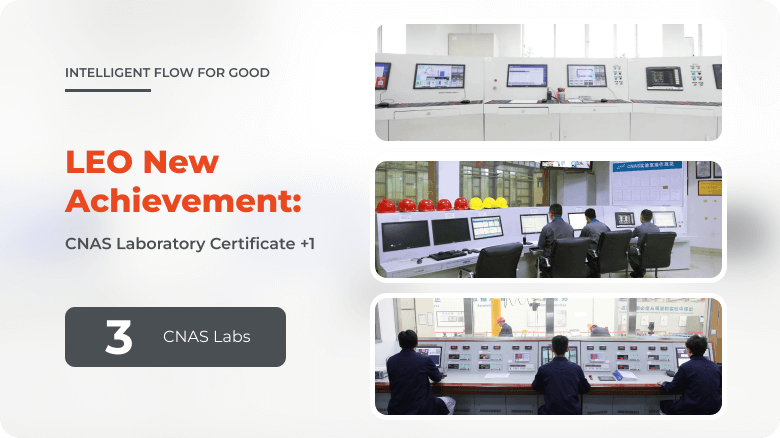
LEO Expands Global Q...
2024.09.06


LEO in Action: Power...
2024.08.02


LEO Event Highlight ...
2024.06.07


LEO PUMP at IFAT Mun...
2024.04.28


LEO PUMP at 135th Ca...
2024.04.01


LEO PUMP at MCE 2024...
2024.03.06

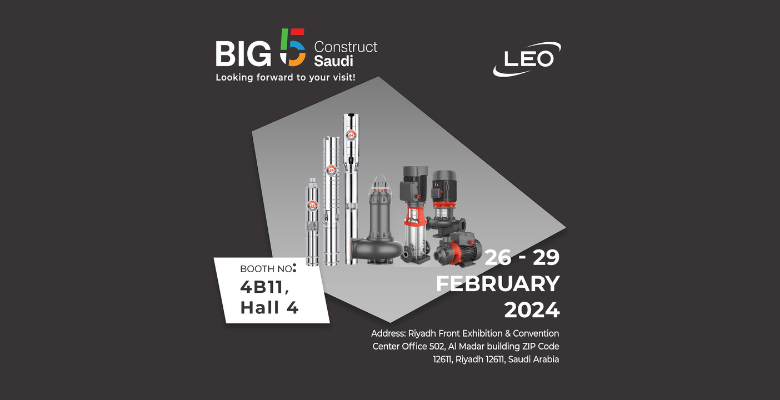
LEO PUMP at Big 5 Co...
2024.02.20


LEO PUMP at THE BIG ...
2023.11.16


LEO's Key Role in Wi...
2023.11.04

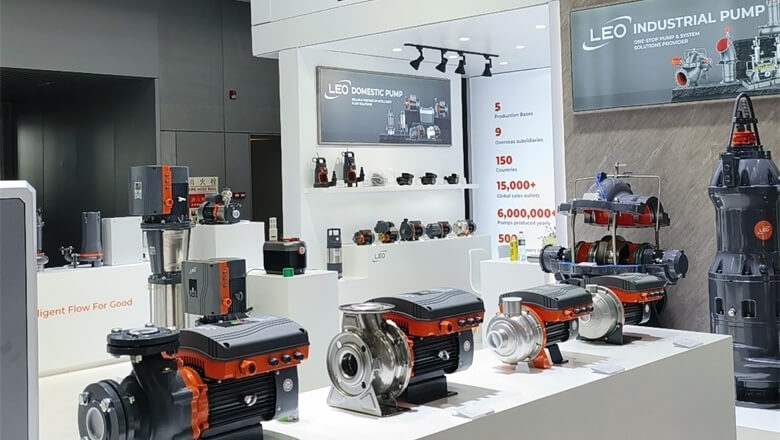
LEO at 134th Canton ...
2023.10.18

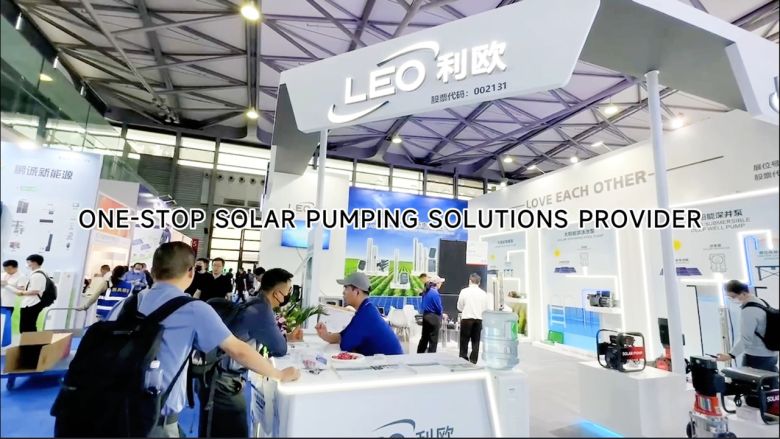
LEO PUMP at SNEC PV ...
2023.06.02


LEO Solution of Wate...
2022.09.28


LEO Project - Solar ...
2022.08.31


LEO Flagship Showroo...
2022.06.28

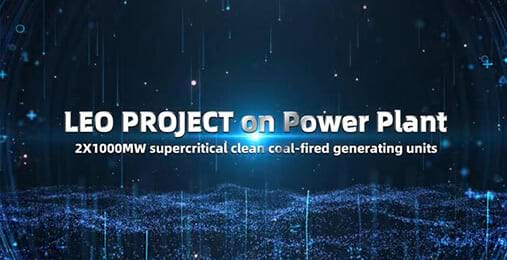
LEO Project on Power...
2022.06.22













